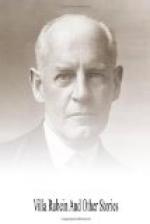“Do you never ‘play’ here?” I asked him.
“Play? No. It must be very interesting; most exciting, but as a matter of fact, I can’t afford it. If one has very little, one is too nervous.”
He had stopped in front of a small hairdresser’s shop. “I live here,” he said, raising his hat again. “Au revoir!—unless I can offer you a glass of tea. It’s all ready. Come! I’ve brought you out of your way; give me the pleasure!”
I have never met a man so free from all self-consciousness, and yet so delicate and diffident the combination is a rare one. We went up a steep staircase to a room on the second floor. My companion threw the shutters open, setting all the flies buzzing. The top of a plane-tree was on a level with the window, and all its little brown balls were dancing, quite close, in the wind. As he had promised, an urn was hissing on a table; there was also a small brown teapot, some sugar, slices of lemon, and glasses. A bed, washstand, cupboard, tin trunk, two chairs, and a small rug were all the furniture. Above the bed a sword in a leather sheath was suspended from two nails. The photograph of a girl stood on the closed stove. My host went to the cupboard and produced a bottle, a glass, and a second spoon. When the cork was drawn, the scent of rum escaped into the air. He sniffed at it and dropped a teaspoonful into both glasses.
“This is a trick I learned from the Russians after Plevna; they had my little finger, so I deserved something in exchange.” He looked round; his eyes, his whole face, seemed to twinkle. “I assure you it was worth it—makes all the difference. Try!” He poured off the tea.
“Had you a sympathy with the Turks?”
“The weaker side—” He paused abruptly, then added: “But it was not that.” Over his face innumerable crow’s-feet had suddenly appeared, his eyes twitched; he went on hurriedly, “I had to find something to do just then—it was necessary.” He stared into his glass; and it was some time before I ventured to ask if he had seen much fighting.
“Yes,” he replied gravely, “nearly twenty years altogether; I was one of Garibaldi’s Mille in ’60.”
“Surely you are not Italian?”
He leaned forward with his hands on his knees. “I was in Genoa at that time learning banking; Garibaldi was a wonderful man! One could not help it.” He spoke quite simply. “You might say it was like seeing a little man stand up to a ring of great hulking fellows; I went, just as you would have gone, if you’d been there. I was not long with them—our war began; I had to go back home.” He said this as if there had been but one war since the world began. “In ’60,” he mused, “till ’65. Just think of it! The poor country. Why, in my State, South Carolina—I was through it all—nobody could be spared there—we were one to three.”
“I suppose you have a love of fighting?”




